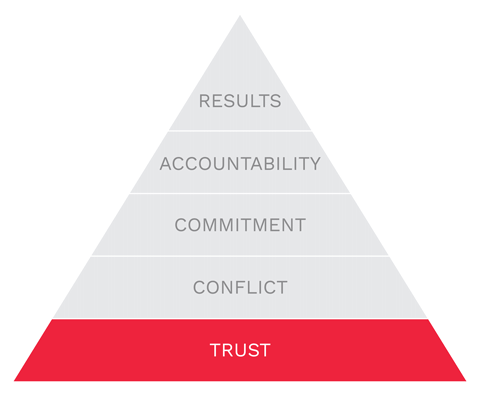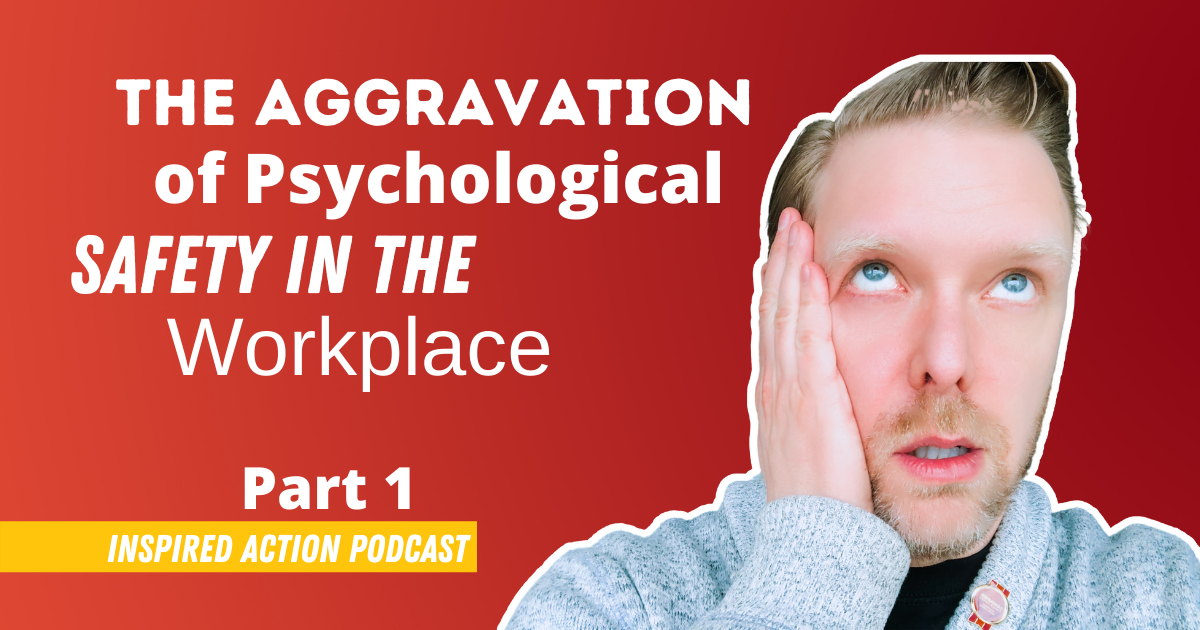“The Aggravation of Psychological Safety in the Workplace – Part 1” Brief Summary:
“How come your billables are so low, you need to get your billables up. This is their very first in-person meeting. Post pandemic. Why do you think the billables are low? You f***ing idiot! Like, are you stupid?”
Post-pandemic, when in the workplace do you feel there is psychological safety, or do you feel like your leaders have abandoned you and they are only concerned with the bottom line. In this Inspired Action for Imperfect Humans podcast episode, Christopher Lawrence and Kyle Kalloo discuss psychological safety, and why it is essential in the workplace.
Summary:
- Introduction
- Workplace burnout
- Humanizing leadership
- Christopher shares stories about failing leadership practices
- The 5 Behaviours of a Cohesive Team
- Kyle shares a story about workplace culture
Calls to Action:
Even before the remote workforce evolution, office culture was inherently fragile. After all, it’s made up of imperfect humans interacting with other imperfect humans. And while perfection isn’t the goal, we all secretly wish for a workplace where people find ways to bring out the best in each other. Unfortunately, that’s not always an intuitive skill. It takes guidance, practice, and then more guidance and practice… but with the right leadership, it’s definitely achievable. How do you enhance your workforce’s ability to engage, collaborate, and adapt in this volatile and uncertain reality? Get the answers to your culture questions when you setup a complimentary Discovery Session with Kyle Kalloo at https://ChangeMyLifeCoaching.as.me/?appointmentType=14623413
Not loving your career? Feel you need a change in your job? Let’s Strategize! Book a complimentary Strategy Session with Christopher Lawrence here: https://ChangeMyLifeCoaching.as.me/?appointmentType=14044176
Tell us your “inspired stories” stories by visiting www.InspiredActionPodcast.ca
Christopher Lawrence LinkedIn: https://www.linkedin.com/in/career-life-coach-christopher-lawrence/
Kyle Kalloo LinkedIn: https://www.linkedin.com/in/kyle-kalloo/
Change My Life Coaching & Change My Business Coaching LinkedIn: https://www.linkedin.com/company/6446498/admin/
Looking to create a corporate coaching culture? Reach out to Kyle Kalloo: [email protected]
Website: https://strategicleader.ca
“The Aggravation of Psychological Safety in the Workplace – Part 1” Transcript:
[00:00:00] How come your billables are so low, you need to get your billables up. This is their very first in-person meeting. Post pandemic. Why do you think the billables are low? You fucking idiot? Like, are you stupid? Is the thought of being imperfect, keeping you from taking action. Welcome to inspired action for imperfect humans.
Each week, we give you real life stories and thought provoking research that inspires your soul to live a more fulfilled life through your own actions. From the heart of Calgary Canada. Here are your hosts. Award-winning coaches. Christopher Lawrence in Kyle Kalloo. Hello? Hello, and welcome to another inspiring week of it.
Our podcasts in perf inspired action for imperfect humans. Uh, Christopher and I are so excited to talk about today, but before we do that, let me just check in with Christopher, Christopher. [00:01:00] How’s your normal, we’re excited. You don’t know, you didn’t check in with me before. What makes you think I’m excited?
Actually, I’m not. Uh, checking in now I made an assumption there. I am. I feel, I feel, uh, sorry about that throat clearing there. Sorry about that. Uh, I feel tired and worried, honestly, worried or weary, worried in weary, weary and wary. Um, you know, our Kyle, I. We’ve been coaching a long time and we’ve coached thousands of people in one-on-one settings and we’ve coached over 10,000 people in group settings.
I’m watching what’s happening right now. You know, things are opening up where we are in the world. And basically we’re not really back to normal. I don’t know what [00:02:00] normal is anymore. Like, I don’t know. But I think, you know, people are moving forward with their lives, but they’re not moving forward with their lives.
Like people are still exhausted. Like in my personal practice, I am seeing more burnout now than I think I’ve ever seen. Like even during the pandemic, there’s more burnout now than there was. Um, during pandemic, I think people are just, you know, it’s like, um, you ever been in that situation, Kyle, where it’s like, you’re so stressed and pent up and working so hard and then you go on vacation and you get sick.
It’s like your body just kind of goes like, why. It’s interesting. You said that only because, you know, I was just going to say, when you said burned out, the trigger has been stressed. And I find a lot of my clients didn’t even recognize their stress. Right. Because they’ve done so [00:03:00] well at trying to move through it and is moving through it.
And, and we’ve also heard people say, cause I, I used to be that way where it took me two days. On a vacation to get, you know, to really kind of level down before it could start the captioning, you know, and some people said, oh, it takes me two to three days. And then you only have two, three days wherever you went and then you have to come back and they’re like, what’s the point?
Right. So I agree with you. Yeah, for sure. You know, Kyle, I think you hit the nail on the head there. I’m going to share a couple of stories and I’m mad I’m mad right now. Actually I’m angry. I’m angry with leadership. And girl. I love leadership, but come on, I going to tell you sometimes, like I got a comment before we get into that, I got a common amount of times and they said, you know, I know you guys are trying to help leadership, but it’s almost sounds like, you know, you’re ragging on them.

Sometimes. Listen, the leaders who do not want to improve or develop. I say, I agree. [00:04:00] I agree with you. I do. I agree with their comment. I do think we right on leadership. I’ve been called out for that before, not even just on this podcast. And I’m sorry if you’re in leadership, I recognize that you are also a human being, but show your.
Side, and then we’ll stop ragging on you when you come forward and say, I’m also struggling. I’ve made a mistake. I’m sorry. And you stop getting on your high horse and thinking that everything you do is right, just because you’re the leader. And you start to say, I don’t know if it’s right, but somebody’s got to make a decision.
And maybe the decision I’ve made was the wrong one. You recognize that your people are struggling just as hard as you are. Um, then I’ll stop ragging on you. Um, and, and I agree, like, I think, I think when people are faced with what they don’t want to hear, and this is the challenge, Kyle, that I think we often face in our style of coaching, which is that, um, leaders don’t want to be told that their shit stinks, but their shit stinks.
Absolutely. And here’s the other piece. I learned [00:05:00] this all leaders. I’m not saying that, but I would say less than half, I’d say less than a quarter are what I would. Good well-polished leaders who continue to do their own personal work. Absolutely. I remember something my mom said I usually use it when I’m faced with that type of scenario where someone says, you know, I’m ragging on leaders as well.
You know, my mom said, you know, I was, I was in my junior years of a leader and she said, it is your responsibility. As I was about to broach into leadership. She’s like, it’s your responsibility. She goes, you know, parents’ thing is to try to keep their PA their kids safe. And when they leave that. And they go to work.
It’s the leader’s responsibility to keep them safe. Like someone has to. And you notice you ever see a court case where it comes to labor laws and stuff like that. The judge always is heavier on the leader because they’re saying you ought to know. Right. It is your responsibility as a leader to make sure there’s fair practice and all that other stuff.
So that is why we tend to sometimes rag on it. [00:06:00] And again, we’re not just pulling this stuff because we’re just bashing meters. We’re actually trying to give you nuggets to actually make it way more human for you and way more effective for the people who you’re leading, because they want you to lead.
And one last thing I would say on this is that I find employees on the front lines and, you know, they’re way more forgiving. They’re way more forgiving a leader sometimes can just do one little thing and they’re going to be like, okay, great. That’s fine. That’s fantastic. Right. So I just think when an employee leaves, not, I don’t know about you and your work experience, but when you left a company, how many things went wrong?
Like there had to be so many things over the years, whatever had gone wrong before. You don’t leave at one thing, right? You don’t, you don’t. So, Kyle later today, we’re going to share a bit of an article written by Scott Zimmerman. Um, he’s the founder of adaptive edge. Um, we have no affiliation with Scott or adaptive edge.
I just think that, [00:07:00] uh, he has written this phenomenal article, which was actually in September of 2020. I still think it’s relevant today. It’s called you can’t fix what you can’t see. And that’s unreal. Dash leaders.com. Um, we’re, we’re going to share a bit of what he says. Cause I think he really gets to the, to the nuts and bolts of, um, I’ve kind of what’s going on.
I want to share a couple of stories just because I think stories can help validate people through shared experience. I’ve got a client right now, um, uh, who works in a law firm and this is a fairly decent sized law firm in Calgary. Um, and they’ll know who they are, but I won’t say who they are. Um, they are bleeding people right now.

Like they literally have lawyers just walking out the door. Sometimes Kyle, between two to five a week, they’re losing two to five associates a week. This is a top heavy organization where [00:08:00]most of the organization is. Are partners and a smaller amount associates. So, I mean, you can imagine how impossible it is to move that Titanic of a ship without having good protocol.
In any case, they’re struggling, their leadership is struggling. These, these are lawyers, they’re not leaders, and I’m not saying lawyers can’t be leaders. But what I’m saying is that they’re not trained as leaders. They’re trained as lawyers, and they’re doing nothing in the organization to really. Um, provide leadership and support for their associates.
I want to share this with you and our listeners, because this is the kind of bullshit that’s happening right now. And this is why I rag on leaders. And I know it’s not every leader and not every organization. Right. But, but here’s the thing. We literally, Kyle, in this, in this organization, they have their very first in-person.
[00:09:00] Meeting and, uh, with their associates and do you know, their, their partner said, what’s that? How come your billables are so low? You need to get your billables up. This is their very first in-person meeting post pandemic. Why do you think the billables are low? You fucking idiot. Like, are you stupid? Like you’re stupid.
Right. And, and is that so, so they’re focused on billables focused on billables, focused on billables and they’re bleeding people in there, like, Hmm. No connection there. Right. And so it’s like, I just. I don’t understand. I don’t understand. Like I understand, I understand why they’re focused on, on, on billables in this kind of thing.
But what I like, yes, you have to be, I mean, the billables approach, from my perspective, this is the way of the Dodo. It’s an archaic motivational system that doesn’t work [00:10:00] anymore. And I understand that. Are you serious? Like people are literally just coming out of this. They’re emotionally drained. They’re psychologically drained.
They’re burnt out because of their own circumstances and people are leaving. And your first comment is how come our billables are so low. Absolutely. And listen, I don’t want to take away anything from what you said, because that’s exactly it. And you started to talk about something. I’m just going to flip it and say the flip side for those who are listening and watching is saying, well, yeah, billables, you have to make money.
And no one is saying you don’t have to make money. No one is saying money is a dirty word. The question is. Path is the most effective, efficient way for you to take that is going to inspire people. Because if you’re just looking at it, transactionally only for that person in front of you, then it costs you more to retrain and onboard a new person to actually get them.
And you’re not going to get the best because you know, these types of people when you’re only focused on money, they’ll make money over here. But. [00:11:00] Lead money somewhere else. Those are people who won’t say anything when they’re like, I could have said something cause I could cost us money or I can take care of this equipment.
Or could you use this tool differently? Right. So we’re saying, yes, there’s ways you can make money. But if that is your first priority, what you’ve just done is you told your employees that they don’t matter what matters more. Is money at all costs. And there’s no psychological safety. You’ve destroyed the trust of your people.
When we look at, um, Patrick Lencioni and the five behaviors of a cohesive team, which is something that, um, we go into organizations, we assess in teams of eight and we can uncover, um, uh, trust is key. And without trust you literally have nothing. Kyle. Do you want him to talk just a little bit? Trust sits in that pyramid.

Yeah. So when we take a look at the pyramid and depending we may put a little quick little copy on the show notes, uh, we’ll see what, uh, Shane can help us with, but [00:12:00] we’ll take a look at it. When you take a look at the pyramid on the bottom of is trust. And if you don’t have trust and I’m talking about vulnerability based trust, we’re not talking about, well, I trust you.
No, no. We’re talking about, I trust you enough that I’m going to share some of my stories with you. I trust you enough that I have. The problems engaging without feeling that you’re going to reprimand me or use it against me. That’s the trust we’re talking about. And when people have that, that go to the next level, which is there could engage into conflict, right.
They could have conversations with you without feeling. Absolutely right. Is where the behavior is productive. It’s not you going to retaliate or anything, right. People will make commitments. Um, I think. Yeah. And so after we do the conflict, then they, they could go to the third piece where it’s about commitment.
Right. They’re going to take commitment. I, I agree. And I think commitment, and then we go into results or accountability and results. Right. I want to focus on that, that [00:13:00] trust leading to productive conflict. I think the point is, is that right now, your teams, if you are a leader, listening to this, your teams are not.
Telling you what they need to tell you because there isn’t trust. Here’s, here’s an example of destroying psychological safety in an organization. I have another client works for a major company, major transportation company here in Canada. This company says. Uh, all mandates in our province are being lifted as of March 1st.
And everyone is back to work on March 1st. So no transition plan, no check on psychological safety, no check on those with immunocompromization. And they said, and by the way, there will never be a hybrid work environment in our office. And I just think to myself, I’m like, you’re going to bleed people during this labor shortage for the next 10 years, and you’re just going to throw money at it and yeah, money will [00:14:00] get people in the door, but it’s not going to keep them there.
Your system is archaic and you’ve destroyed the trust. Literally. Everybody came back. The entire company we’re talking, they have an office here that I think has maybe five or 10,000 people in it. And everybody was like, literally, they might as well have taken the door off the hinges because everyone was moving their computer equipment back in all of their office stuff.
You know, nearly two full years of being away and everyone’s back on the same day. So there’s no trust, like, like it’s like, and everyone’s like, uh, and, and the people in the company, Kyle don’t feel like they have a voice. They don’t feel like they can say anything because it’s so punitive that they’re just going to get fired.
And I’m like, I’m like shame on you, shame on you. And just in some context, is that the company, the organization, they were for over two years, they were able to do the job. Or is it predominantly when there, when there were, when restrictions were, were [00:15:00] lifted in, in their main province, they would send people back into the office for a few months at a time.
So usually I think they came back maybe once or twice during pandemic times, but it was very short-lived and a lot of people had options and they took more of a phased approach to it. Um, no, not now. And the thing is, is like, it’s not, I think the thing is that if you’re just looking at COVID research, which is, I think there’s good research.
I think there’s a lot of bad research in quotations, but I think the point is is that you’re like, well, this is what COVID is, and this is what the government mandate is. And so we shouldn’t be worried about it. And it’s like, I agree. I think that, that it’s okay for us to feel safer and more comfortable with the fact that.

In your lifetime, you’re probably going to contract a COVID virus and you’re probably going to get through it for most of us. Right. I think it’s okay that we do that, but that doesn’t mean that that’s where people’s psychological safety is. And so there was a complete disconnect and this is the shit that [00:16:00] burns my ass in organizations, Kyle, it burns my ass because they’re just doing what they’ve always done and they’re not understanding.
It’s like, well, why are people leaving? And then they see, well, you know, it’s. They take a sour grapes approach to it. And they’re like, they’re like, well, you know, maybe we need to cut some of this dead wood. Maybe we need to, you know, like, like it’s like trim the fat, like this is blah, blah, blah. So I think, yeah.
So I think what we’re trying to say is I do not believe in sounds like you agree. There is no back to normal. We have just gone through a pandemic. We’ve just gone through something catastrophic and everyone’s organization. All of these other things are quite unique. So I think what people really are doing out there is recreating their.
Right. They’re recreating their new norm and it’s going to be stressful. It’s going to be leading to burnout. And I think this is where employers and employees need to really align [00:17:00] better around. What does this look like? Um, before we hear some tips that maybe. Christopher. I wanted to say really quickly.
We have, I have a client who they’re in that commercial space, commercial brokerage space. And one of the things that they’re helping their clients to see is to redefine the workspace. Meaning they’re recognizing for some organization that the workspace is not just about doing work anymore. It’s about building culture.
So therefore they have their office set up where they’re saying, Hey, we get that. You’re going to talk, you know, at the, you know, coffee machine or the water cooler. But we want that because what is fundamental is culture, because culture will allow us to get through it from an hybrid method from in-person.
Right. And so I admire them, helping their clients see that there’s another way that they can connect. I a hundred percent agree with you. I think that, I do think that hybrid work environment really is the way of the future. I think that people do want [00:18:00] some time in the office and they want some time out of the office.
I think that we should be measuring productivity and deliverables rather than hours. Um, and I think that would solve a lot of this. Kyle. I think that we’re going to have to make this a two-parter because I really want to dive into. Um, from, uh, from Scott Zimmerman here in the article, you can’t fix what you can’t see.
So Kyle, if you could give people one thing to think about or do, um, leaders and employees, um, between now and next week’s podcast, one, we’re gonna really kind of read this message out. Yeah. I think the main thing for me is going back to some things that we often talk about is being really clear with what you want.
Right. So let’s not think about your boss is going to say no right away and blah, blah. Let’s just not think about how we’re going to do it. I just think for now, if you can just be really clear by saying, what does that, and literally plan it through in your head. Right. So [00:19:00] what if I do go back to the. How will I feel about it?

What would I look about it? What are some things I want to be able to accomplish? Um, what if it’s a hybrid method? What if it’s completely stay at home and my set up for that, because that’s the other thing too. I think sometimes people don’t realize that they’re going to do either or make sure your space or environment mentally you’re set up for it.
So I’ll all I would say is until next week. Think about that. Just think about what is. We’ll help you next week to talk about how do you mean one approach that with your boss or leader or others? Maybe it could be. I agree with you, Kyle. And I think like wholeheartedly, that is where the first step is. I would word it in a different way, which is identify your needs, wants, and desires, and recognize that they’re all important for your life.
And you need to be specific with what you know today. It’s okay. If they change. It’s okay if you’re uncertain, but just with what you know today, what do you think those needs wants and desires [00:20:00] are during this time to create psychological safety? To make your, your work more enjoyable and make you fall in love with it all over again, and to move through some of the burnout.
Um, I think without doing that, you, you leave too much in the hands ear, in the passenger seat of your life and your career. If you’re not sitting down and identifying needs, And even include, like I said, your environment. So if you have a partner, if you have roommates, if you have like include those people, cause you may be gone home about it, but it may change what they do as well.
So I think it’s about communicating your needs, wants and desires to them as well. We’ll see you next week. It’s our goal to build a global community of inspired action takers, and we can only do that with your health. So if you love inspired action, please leave a review on your favorite podcasting app.
Share us on your socials. You’ve heard from us. Now. We want to hear from you go to inspired action podcast.ca and tell us what is the inspired action you took this [00:21:00] week? Next week on inspired action for imperfect humans. It is a losing strategy to attempt to succeed tomorrow with yesterday’s thinking and doing. Hello.



